
The lime-speck pug is a moth of the family Geometridae. It is a common species throughout the Palearctic region, the Near East and North Africa.

The tawny speckled pug is a moth of the family Geometridae.
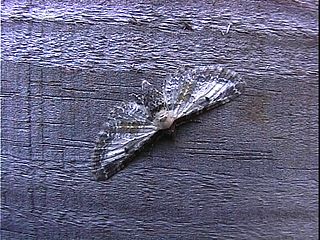
The bordered pug is a moth of the family Geometridae. It is found across the Palearctic region. In the Pyrenees, the species can be found up to an altitude of 1800 metres. It prefers steppe areas, open bushy terrain, fallow and unimproved grasslands and parkland.

The goldenrod pug is a moth of the family Geometridae. The species was first described by Henry Doubleday in 1861. It is found throughout the Palearctic region. In the British Isles it is widespread but rather locally distributed.

The juniper pug or juniper looper is a moth of the family Geometridae. The species was first described by Michael Denis and Ignaz Schiffermüller in 1775. It is found throughout the Palearctic and in the Nearctic.

Freyer's pug is a moth of the family Geometridae. The species can be found in Europe, east to the Urals, the Russian Far East, Kazakhstan and China. It is also found in North America.

Eupithecia tantillaria, the dwarf pug, is a moth of the family Geometridae. It was described by Jean Baptiste Boisduval in 1840. The species can be found in the Palearctic realm.
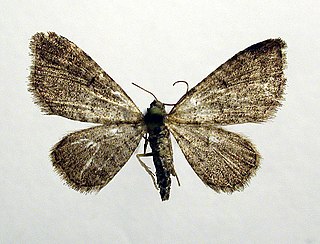
Eupithecia plumbeolata, the lead-coloured pug, is a moth of the family Geometridae. The species can be found all over Europe ranging to the Urals, then through Central Asia to Siberia and to Sayan mountains, the Altai and the Amur. In the Alps, the species occurs up 2000 metres above sea level and in the Pyrenees up to in 2400 metres.

Eupithecia linariata, the toadflax pug, is a moth of the family Geometridae. The species can be found in Europe and from Anatolia to Tajikistan and Iran.

Eupithecia insigniata, the pinion-spotted pug, is a moth of the family Geometridae. The species can be found in Europe and Turkey.
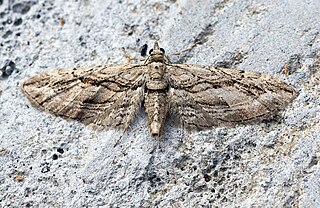
Eupithecia phoeniceata, the cypress pug, is a moth of the family Geometridae. The species was first described by Jules Pierre Rambur in 1834 and it can be found in Europe.

Eupithecia millefoliata, the yarrow pug, is a moth of the family Geometridae. The species was first described by Adolph Rössler in 1866 and it can be found in Europe and Russia.

Eupithecia simpliciata, the plain pug, is a moth of the family Geometridae. It is found in the Palearctic realm, from western Europe to north-western China (Xinjiang). The species primarily colonizes wastelands, rubble and abandoned vineyards, and in Asia also salt steppes. In the Alps, the range of altitude extends up to 1200 metres.

Eupithecia tripunctaria, the white-spotted pug, is a moth of the family Geometridae. The species can be found from Europe to Korea and Japan and in North America.
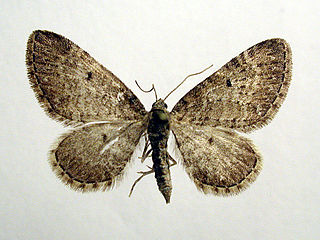
Eupithecia satyrata, the satyr pug, is a species of moth of the family Geometridae. It was described by Jacob Hübner in 1813. It is found from Ireland, through northern and central Europe east to all of Russia and central Asia and western Siberia to Tibet. It is also present in North Africa and North America.

Eupithecia actaeata is a Eurasian species of moth of the family Geometridae.
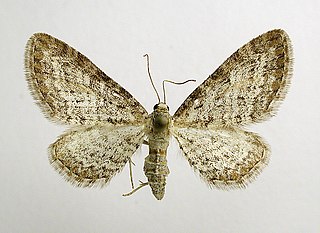
Eupithecia subumbrata, the shaded pug, is a moth of the family Geometridae. The species was first described by Michael Denis and Ignaz Schiffermüller in 1775. It is found from Mongolia and the Altai Mountains through Siberia, central Asia, Asia Minor and Russia to western Europe and from central Scandinavia to the Mediterranean region.
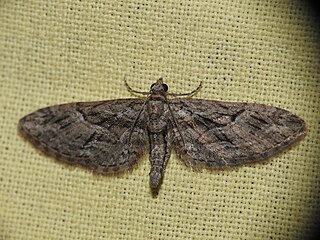
Eupithecia oxycedrata is a species of moth in the family Geometridae. It is found in Spain, southern Portugal, the Balearic Islands, southern France, Corsica, Sardinia, Sicily, Malta, Italy, Slovenia, Croatia, Bosnia and Herzegovina, Montenegro, North Macedonia, Bulgaria, Greece, Crete, western Romania and the Crimea. It is also found in North Africa, from Morocco to Tunisia, and in Turkey. The habitat consists of dry maquis, especially where junipers grow.

Eupithecia scopariata is a moth in the family Geometridae. It is found in France, Spain, Portugal, Italy, Croatia, Greece and on Corsica and Sardinia.

Larentia malvata is a moth of the family Geometridae. It was described by Rambur in 1833. It is found in Portugal, Spain, France, Italy, Croatia, Greece, as well as on Sardinia, Corsica, Sicily, Malta and Crete.




















